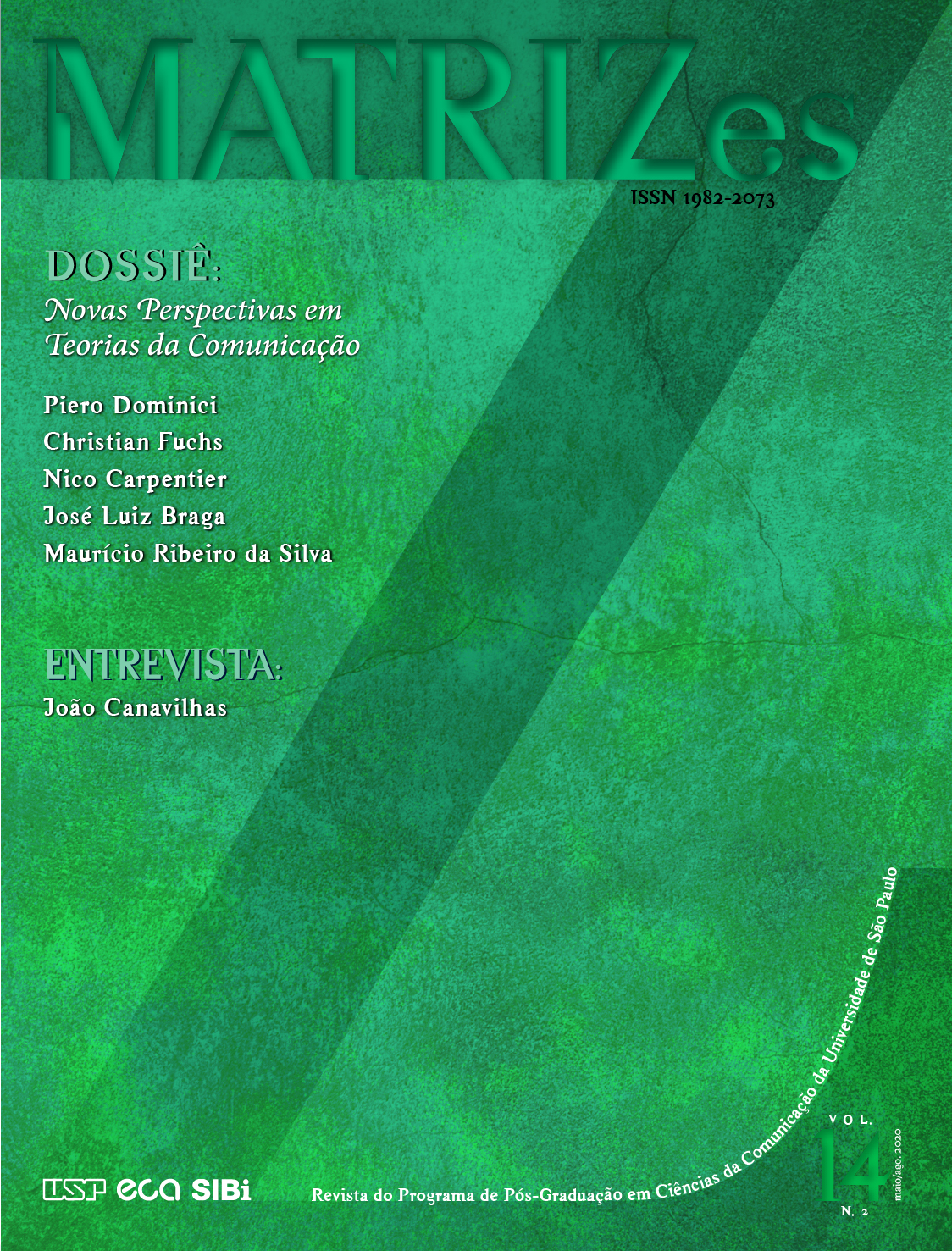Everyday life and everyday communication in coronavirus capitalism
DOI:
https://doi.org/10.11606/issn.1982-8160.v14i2p41-73Keywords:
Coronavirus, Everyday life, Everyday communication, Critical theory, Critical theory of communicationAbstract
In 2020, the coronavirus crisis ruptured societies and their everyday life around the globe. This article is a contribution to critically theorising the changes societies have undergone in the light of the crisis. It asks: How have everyday life and everyday communication changed in the coronavirus crisis? How does capitalism shape everyday life and everyday communication during this crisis? Organized in sections, the second one focuses on how social space, everyday life, and everyday communication have changed during the coronavirus crisis. The third one focuses on the communication of ideology in the context of coronavirus by analyzing the communication of coronavirus conspiracy stories and false coronavirus news.
Downloads
References
Andersen, K. G. (2020). The proximal origin of SARS-CoV-2. Nature Medicine, 25, 450-452. https://doi.org/10.1038/s41591-020-0820-9
Austria Press Agency (APA). (2020, 25 de março). 153.100 mehr Arbeitslose seit 15. März. Wiener Zeitung. https://bit.ly/3jIIZYn
Beck, U. (1992). Risk society: Towards a new modernity. Sage.
Calisher, C. et al. (2020). Statement in support of the scientists, public health professionals, and medical professionals of China combatting Covid-19. The Lancet, 395(10226), e42-e43. https://doi.org/10.1016/S0140-6736(20)30418-9
Cohen, J. (2020a, 31 de janeiro). Mining coronavirus genomes for clues to the outbreak’s origins. Science Magazine. https://bit.ly/31Xkh0c
Cohen, J. (2020b, 19 de fevereiro). Scientists “strongly condemn” rumors and conspiracy theories about origin of coronavirus outbreak. Science Magazine. https://bit.ly/2Z3vw5D
Coronavirus pandemic in mainland China. (2020). In Wikipedia. https://bit.ly/2Z7RnJ7, acesso em 27 mar. 2020.
Cyranoski, D. (2020). Mystery deepens over animal source of coronavirus. Nature, 579, 18-19. https://doi.org/10.1038/d41586-020-00548-w
Davis, M. (2020, 14 de março). In a plague year. Jacobin. https://bit.ly/3h1pQz8
Fuchs, C. (2020a). Communication and capitalism: A critical theory. University of Westminster Press.
Fuchs, C. (2020b). Nationalism on the internet: Critical theory and ideology in the age of social media and fake news. Routledge.
Fuchs, C. (2021). Social media: A critical introduction (3a ed.). Sage.
Galton, F. (1909). Essays in in eugenics. The Eugenics Education Society.
Garrison, R. D. (2011). E-Learning in the 21st century. A framework for research and practice (2a ed.). Routledge.
Giddens, A. (1984). The constitution of society: Outline of the theory of structuration. Polity.
Harvey, D. (2001). Spaces of capital: Towards a critical geography. Routledge.
Harvey, D. (2005). Space as keyword. In D. Harvey, Spaces of neoliberalization (pp. 93-115). Franz Steiner Verlag.
Harvey, D. (2020, 20 de março). Anti-capitalist politics in the time of Covid-19. Jacobin. https://bit.ly/2Z4WNog
I’m Your President. (2020, 24 de fevereiro). The Rush Limbaugh Show 2/24/20 EIB podcast [Vídeo]. YouTube. https://bit.ly/2EWYEVh
Key, P. (2020, 24 de fevereiro). Limbaugh: Coronavirus being “weaponized” to bring down Trump. Breitbart. https://bit.ly/3jLLXeU
Kopecki, D. (2020, 18 de março). WHO officials warn US President Trump against calling coronavirus the “Chinese virus”. CNBC. https://cnb.cx/31VN19E
Lam, T. T.-Y. et al. (2020). Identifying SARS-CoV-2 related coronaviruses in Malayan pangolins. Nature, 583, 282-285. https://doi.org/10.1038/s41586-020-2169-0
Lefebvre, H. (1991). The production of space. Blackwell. (Obra original publicada em 1974)
Lefebvre, H. (2002). Critique of everyday life. Volume II: foundations for a sociology of the everyday. Verso.
List of most-listened-to radio programs. (2020). In Wikipedia. https://bit.ly/2QS1UUr, acesso em 27 mar. 2020.
Luxemburgo, R. (1916). The Junius pamphlet. In R. Luxemburgo, Rosa Luxemburg speaks (pp. 371-477). Pathfinder.
Luxemburgo, R. (1971). Selected political writings of Rosa Luxemburg. Monthly Review Press.
Mangan, D. (2020, 19 de março). Trump blames China for coronavirus pandemic: “The world is paying a very big price for what they did”. CNBC. https://cnb.cx/2EZzdCz
McCarthy, B. (2020, 27 de fevereiro). Fact-checking Rush Limbaugh’s misleading claim that the new coronavirus is “the common cold”. PolitiFact. https://bit.ly/2F8Kos4
Mies, M., Bennholdt-Thomsen, V., & Werlhof, C. (1988). Women: The last colony. Zed Books.
Misinformation related to the Covid-19 pandemic. (2020). In Wikipedia. https://bit.ly/3hYSvpN, acesso em 27 mar. 2020.
Organização Mundial da Saúde (OMS). (2020, 12 de março). WHO announces Covid-19 outbreak a pandemic. WHO. https://bit.ly/3gWNnkR
Rosa, H. (2020a, 18 de março). Interview. Philosophie Magazin. https://bit.ly/3jO3NOn
Rosa, H. (2020b, 25 de março). Interview. TAZ. https://bit.ly/3boGYh4
Sassen, S. (1991). The global city. NJL Princeton University Press.
Sky News (2020, 13 de março). UK needs to get Covid-19 for “herd immunity” [Vídeo]. YouTube. https://bit.ly/2Z2Vmqc
Sprunt, B. (2020, 27 de março). Bernie Sanders on his campaign: “It’s going to be a very steep road”. NPR. https://n.pr/2Z7qd50
Wallace, A. R. (2009). Darwinism. Cambridge University Press. (Obra original publicada em 1889)
Wallace, R., Liebman, A., Chavez L. F., & Wallace, R. (2020). Covid-19 and circuits of capital. Monthly Review, 72(1). https://bit.ly/3h5sRyF
Ye, Z.-W. et al. (2020). Zoontic origins of human coronavirus. International Journal of Biological Sciences, 16(10), 1686-1697. https://dx.doi.org/10.7150%2Fijbs.45472
York, A. (2020). Novel coronavirus takes flight from bats? Nature Reviews Microbiology, 18, 191. https://doi.org/10.1038/s41579-020-0336-9
Zhou, P. et al. (2020). A pneumonia outbreak associated with a new coronavirus of probable bat origin. Nature, 579, 270-273. https://doi.org/10.1038/s41586-020-2012-7
Žižek, S. (2020, 16 de março). Monitor and punish? Yes, please! The Philosophical Salon. https://bit.ly/3i0ZheW
Downloads
Published
Issue
Section
License

This work is licensed under a Creative Commons Attribution-NonCommercial-ShareAlike 4.0 International License.
Authors who publish in this journal agree to the following terms:
- Authors retain the copyright and grant the journal the right to first publication, with the work simultaneously licensed under the Creative Commons Attribution License (CC BY-NC-SA 4.0) which allows sharing of the work with acknowledgment of authorship and initial publication in this journal for non-commercial purposes.
- Authors are authorized to assume additional contracts separately, for non-exclusive distribution of the version of the work published in this journal (eg, publishing in institutional repository or as a book chapter), with acknowledgment of authorship and initial publication in this journal.






















